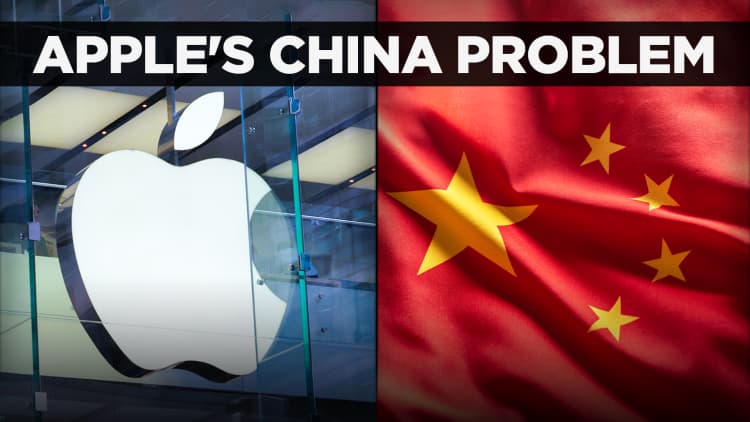Pictured here is a Foxconn factory in Zhengzhou city on Sept. 4, 2021.
Vcg | Visual China Group | Getty Images
Apple iPhone manufacturer Foxconn on Friday posted a dip of 9.6% in revenue for the first quarter of 2024, compared to the same period last year.
The company, which trades as Hon Hai Precision Industry in Taiwan, recorded a first-quarter revenue of 1.32 trillion New Taiwan dollars ($41.2 billion), which was also 28.58% lower compared to the fourth quarter of last year. It was also below economists’ expectations in an LSEG poll.
The company still expects revenue to grow in the second quarter, despite noting that it “remains a traditional off-peak season.”
Foxconn shares were down 1.4% by the market close in Taiwan Friday, prior to the release of the company’s figures at 15:30 p.m. local Taiwan time.

The first quarter is typically a quiet one for smartphone parts manufacturers, as consumer appetite for handsets tends to wane. In the fourth quarter, tech suppliers often race to supply smartphones, tablets and other electronics for tech giants like Apple, to satisfy demand over the holiday period.
There is currently no available data for smartphone shipments in the first quarter of 2024.
Last year, overall shipments declined 3.2%, according to Counterpoint Research, to 1.17 billion units.
AI in focus for investors
Foxconn said that cloud and networking products was a bright spot for the Taiwanese technology giant, and that it saw significant growth in the segment.
The company saw “strong customers’ pull-in for the cloud segment, offsetting negative impact from inventory digestion in networking products,” it said.

Foxconn is increasingly being viewed as a beneficiary of the recent buzz surrounding artificial intelligence. Its stock has risen 14% in the past 12 months.
However, it lags AI chipmaking grandee Nvidia, which has seen shares more than triple in the same timeframe.
Foxconn has gained momentum of late, though, with its shares up nearly 21% year-to-date.
Foxconn makes enterprise servers for AI applications. The cloud is a key technology powering today’s advanced generative AI.
Last year, Foxconn and chipmaking powerhouse Nvidia said they were teaming up on the development of “AI factories,” which they call a new class of data center that uses Nvidia chips to power a “wide range” of applications, including training autonomous vehicles, robotics platforms, and large language models.
Foxconn is expected to hold its next earnings call on May 14.